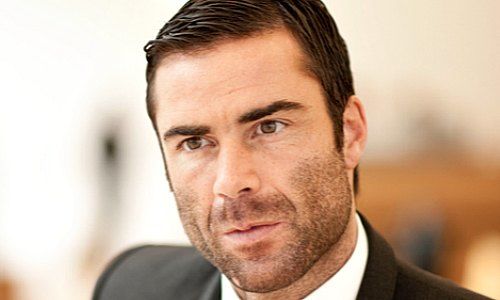Rene Bruelhart: «Never Had a Set Career Plan»
As the Pope's chief financial regulator, Rene Bruelhart has spent the last four years cleaning up after a series of scandals at the Vatican Bank. He speaks to finews.com about his new role at a Swiss mortgage lender.
In a windowless multi-purpose hall 40 kilometers west of Zurich, 1,823 shareholders of Hypothekarbank Lenzburg convene for the Swiss regional bank's annual meeting.
The mood is informal, unpretentious, and festive: local musicians entertain shareholders before the event begins, CEO Marianne Wildi delivers part of her speech in colloquial Swiss-German, and shareholders cheer approvingly when the bank's chairman, Gerhard Hanhart, takes a jab at the million-franc paydays awarded to his peers at UBS.
The folksy Aargau setting couldn’t be more different from St. Peters Square, where Rene Bruelhart spends much of his time as head of the Vatican's Financial Information Authority – effectively, the Holy See's financial regulator.
5,000 Accounts Shut
Formerly Liechtenstein's top anti-money laundering expert, it is Bruelhart's role at the Holy See which has raised the 45-year-old lawyer's profile internationally. Under his auspices, the institute known as the Vatican Bank has shut nearly 5,000 accounts, and the number of potentially suspicious transactions has skyrocketed from less than 10 five years ago to almost 900 in the last three-year period reported.
Despite spending very little of his career in Switzerland, Bruelhart has maintained ties to the alpine nation, taking a board seat at «Hypi» Lenzburg last year. finews.com spoke to Bruelhart about moving from enforcement to banking, what Rome and rural Aargau have in common, and his future plans.
Rene Bruelhart, this is a major change of scenery from Rome, the Vatican and St. Peters Square. How did your role here come about?
I’ve been out of Switzerland for nearly 15 years, and my connection to Switzerland besides my passport has been pretty rudimentary. My role here at Hypi Lenzburg came about because of the combination of their leadership, who are very trustworthy and doing a good job, and through personal contacts.
«Stimulating contrast to the Vatican»
It’s stimulating for me to have such a contrast from my other role, and it’s a nice challenge. It’s a possibility to have more of Switzerland in my work life in an interesting way: this is a regional lender, strongly anchored locally with a relatively conservative business, but also with a strong affinity to fintech and the regulatory challenges that will bring. This combination makes it an interesting one for me to return to Swiss banking.
When you took a seat on Hypi’s board last year, you said you’d be the apprentice for a while. What’s happened since then?
I hope I successfully concluded the first year of my apprenticeship (laughs). In all seriousness, I have a lot of respect for every new professional challenge. Especially here, at a firm which is so firmly connected to this region. With apprenticeship, I meant learning to understand what Hypi does, how it works and its mentality. I think that learning process is concluded.
What attracted you to this bank, over any of the hundreds of other banks in Switzerland?
Let me go back one step: Hypi Lenzburg has an incredibly sound foundation in its core business. If I look ahead, it has several advantages, such as a CEO who has an affinity for and know-how in information technology. Another one is the path that the bank has chosen to embark on with its in-house bank solution Finstar.
«Hypi Lenzburg has an advantage over other Swiss banks»
So you have a solid foundation in the mortgage business and the potential to build a new foundation around the IT business – I believe that is a major advantage to other firms.
Any commonalities between the Holy See and Hypi Lenzburg?
My role at the Holy See carries a certain amount of moral responsibility. Purely from the regulatory side, we have made massive strides in implementing the latest international standards and requirements in the past four years. But the more important obligation is to the 1.2 billion faithful – more important than a shareholder in the economic sense or even than a regulator.
«Certain similarities between the Vatican and Hypi Lenzburg»
I don't want to compare Hypi Lenzburg to the Vatican, but as far as I have experienced it here – and having seen the rush on the shareholder meeting – this bank also has a moral responsibility locally. Be it at the baker’s or in local restaurants and other small businesses, the proximity to its clients, the way we conduct business, the suitability of our leadership – these are all things that I appreciate, but we also bear major responsibility for them.
So your conversion to finance is complete. Can you see yourself taking on other roles in the banking industry?
I already do. When I started to serve the Holy See, I was engaged as an independent adviser. My role has been expanded, but I still see myself as an adviser to the financial services industry. Both the regulatory and supervisory side as well as the private sector one of banking are fascinating, and I think that’s probably not a bad package at financial firms.
You’re 45 now. What is your ten-year career plan?
My path is my plan. I’ll try to continue to do what I enjoy doing, but I’ve never had a set plan for my career.
Rene Bruelhart is head of the Vatican's Financial Intelligence Authority, or AIF, which is the Holy See's financial regulator. The 45-year-old lawyer previously held the role of top Liechtenstein anti-money laundering enforcer as the tiny alpine nation decided to abandon banking secrecy and embrace international standards for preventing financial crime. Bruelhart is a native of Fribourg, where he earned a degree is law. He is also a board member of two corporations in Zurich tied to his advisory work.



























